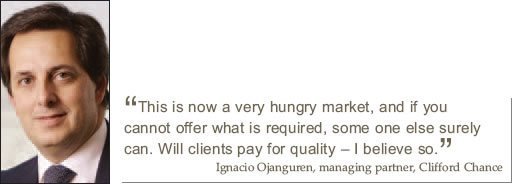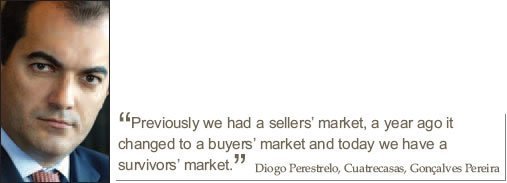Company & Corporate Report 2009: Iberia on hold: surviving the transactional slowdown
Iberia has clearly not proved immune to the global downturn in M&A, say lawyers, with transactional and private equity both significantly down. But while companies may not be expanding, many are restructuring and refinancing in order to survive the current challenging business climate.
A recent report by Goldman Sachs reveals that the volume of global M&A in the first quarter of 2009 was down 36% compared to 2008, with much of the drop attributable to the collapse in private equity activity which saw an 86% fall over the same period.
The level of transactional activity across Iberia has inevitably also been affected. MergerMarket reports thatby volume like for like M&A activity for 2008 was down 16%on 2007, while the first quarter of 2009 is down 66% on the same period last year.
‘There is no doubt that the transactional markets that kept us all so busy have recently changed significantly’ says Salvador Sánchez-Terán, corporate partner at Uría Menéndez.
Iberian Lawyer’s Company and Corporate Special Report 2009 assesses how law firms are adapting to such a dramatic change of events, what this has meant for clients transactional ambitions, and where the opportunities now lie.
Price and timing
The liberal financing arena and highly leveraged deals that have driven the transactional boom of recent years have come to a virtual halt, confirm lawyers. Banks have retreated to focus on managing and divesting themselves of the liabilities and ‘toxic assets’ that have emerged out of the US sub prime crisis, credit crunch, and now global economic crisis.
But the same is true also of many of the companies that embarked on prolific spending in recent years, and who now have to manage substantial debt portfolios at a time when refinancing is proving difficult for most, and impossible for some.
‘Even among buyers with money, many are becoming distracted by their own internal issues. The emphasis therefore for many businesses is on getting their own houses in order rather than looking for further growth,’ says Pedro Rueda, founding partner at Araoz & Rueda in Madrid.
What buyers there are have to work much harder at convincing the banks to support their acquisition ambitions, say others. ‘At the same time, there is a price adjustment process that is still ongoing and there are substantial discrepancies in pricing expectations between buyers and sellers,’ says Fernando de las Cuevas, Head of Corporate at Gómez- Acebo & Pombo.
And what is true for Spain is equally true for Portugal. ‘The issue is that buyers are eager to buy at huge discounts but sellers are not yet desperate. This means that we often face lengthy and thorough due diligence and price negotiations. In short, deals are happening, but taking a lot more time to close,’ says Pedro Cardigos of Cardigos in Lisbon. Joao Vieira De Almeida, managing partner at Vieira De Almeida, agrees. ‘Transaction documents now reflect a radical change in the balance of the parties, with sellers losing much of the strength displayed just a year ago.’
Even in deals that are progressing buyers remain wary. ‘It is a question of price and timing. Buyers are often now waiting until the publication of the next month’s accounts before wanting to make any decisions, and then continuing to wait – we are seeing deals begin and due diligence undertaken but no conclusions,’ says Alejandro Ortiz, Linklaters´ Head of Corporate in Spain.
Self-made problems
For some lawyers, the issues that many companies, banks and finance houses now face are however the product of their own making. The emphasis on lawyers previously, they say, was on closing deals not highlighting their flaws.
‘We have always tried to do our jobs, but the onus was always on the client to listen to what we were telling them. Even when the issues have been highlighted, the clients would often insist on going ahead,’ says Pedro Pérez-Llorca, Managing Partner of Pérez-Llorca.
Mónica Martín de Vidales, corporate partner at Garrigues in Madrid agrees: ‘Over the last few years manyinvestors did not see the need for deep analysis. The emphasis was simply on doing the deal and moving on to the next one. But the job of the lawyer has not changed, it is just that clients appetite for risk has significantly reduced. Investors have moved away from a commodity approach to one in which there is now more rigorous analysis.’
Now there are fewer deals, they are of a lower value and use less financial leverage. Many of the companies that made major international acquisitions in recent years might not have done the same knowing the crippling debt and restructuring issues that they would subsequently, and currently, face, says some.
‘Everybody is in managing portfolio mode. The leverage used in previous deals in many cases needs restructuring,’ agrees Antoni Valverde, corporate partner at Freshfields Bruckhaus Deringer in Barcelona.
Private equity pain

Without a doubt, say lawyers, it is the private equity sector that has been hit hardest by the credit crunch – there is a lack of risk for leveraged acquisitions, reduced exit options from current investments, and refinancing of company portfolios where available is expensive.
‘The market for management buy outs and secondary buyouts has practically dried up and divestments are becoming a difficult task. The need for cash by portfolio companies will probably absorb more time and money from the private equity houses than many expect,’ says Francisco Aldavero partner at Araoz & Rueda.
José María Balañá, Managing Partner of Lovells in Madrid, is among those who emphasise the increasing inward emphasis of private equity house, as they focus on directors liabilities and the management issues emerging around portfolio companies.
The sector is facing a contradictory situation, say some. Many expect a reduction in the value of their non-listed company holdings, echoing the trend of quoted companies, but also want to sell off portfolio companies at ‘old’ values. Prices will have to adjust, to allow both new acquisitions and sales of portfolio companies, but at much lower values than those still being presently demanded.
Now is a time to see which private equity houses have maintained the most realistic business models and leverage rates in recent years. ‘The current financial crises will allow us to see which private equity houses have a sustainable investment structure and a strong profile towards the banks in order to keep active,’ says Diogo Leónidas Rocha at Garrigues in Lisbon.
Likewise, some say, there will be a continuing change in deal emphasis of many private equity houses, with Manuel Barrocas at Barrocas Sarmento Neves among those suggesting that the current market conditions favour the domestic Iberian players most.
‘Domestic Iberian private equity houses are now much more active and regarding ‘internal’ opportunities rather than those emerging in other countries,’ agrees Rodrigo Almeida Dias at F Castelo Branco. ‘Domestic Iberian private equity houses continue being active in the mid-market, but the international buy-out funds that were targeting ever bigger deals are now more inclined to consider the same transactions. The competition is not likely to decrease although certain sponsors may eventually drop out of the market,’ adds Christian Hoedl at Uría Menéndez in Madrid.
Banks and lenders are dictating much tighter credit conditions to the benefit of those with cash to spend. ‘Buyers are required to significantly increase their equity contributions in relation to proposed M&A transactions and as a consequence the leverage ratio of transactions is decreasing dramatically,’ says Jose A. Sánchez Dafos, Head of the Corporate Department at DLA Piper Spain.
Moreover, the current economic and business situation is opening the door to new opportunities, note many, including ‘buy and build’ investments, co-investments with strategic buyers, and the repurchase of portfolio company debt – trading at very heavy discounts.

‘Leveraged buy-outs are currently difficult or even impossible. However, companies divesting from non-strategic assets or going through solvency difficulties are throwing up new opportunities, particularly for private equity houses specialised in distressed companies and assets,’ says Lourdes Ayala Muñoz at Legalia.
Deals being done
Despite the difficulties the current economic and financial situation is presenting, lawyers insist that there remains an appetite for deals – the issue for many buyers and sellers however is one of expectation management.
‘An issue that recurs is the conflict between buyers and sellers expectations. Many sellers believe they can attain prices based on valuations from last year, while many buyers believe they can get the same returns on investment as before. Neither is any longer true,’ says Ignacio Ojanguren, Managing Partner of the Madrid office of Clifford Chance.
What is clear also is that there is now a much reduced appetite for risk, from buyers as much as financiers, and much more restraint towards new deals, notes Fernando Ferreira Pinto, co-managing partner of Sérvulo. ‘Surprisingly – or not – deals are now significantly more simple as complex structures have proven to be hiding higher risks.’
Miguel de Avillez Pereira, corporate partner at Abreu Advogados agrees. ‘In some industries you see assets changing hands to competitors. In other words, there is less space for leveraged deals and more room for strategic acquisitions with the result that deal structures are in many ways returning to more conventional forms.’
But transactions are clearly taking longer, notes Juan Francisco Falcón at Uría Menéndez in Madrid. It is harder to obtain exclusivity while price structures may actually be more complex – with multiple lenders and variable pricing now more common – and buyers ambitions are inevitably being affected.
‘Even buyers with cash are now prepared to walk away from deals where the requisite guarantees, representations or warranties are not there. Clients are listening, and watching, all the time.’ agrees Pedro Pérez-Llorca.
Iberia for sale
While there is little doubt about the issues buyers face there is also no lack of investment opportunities.
‘Spain is for sale. Everything is for sale, but the volatility of the IBEX means that currently there is little confidence in company values and it is perhaps getting worse,’ says Ojanguren.

Many of the current sales are forced or distressed, say others. Many mergers are in fact rescues. The issue for law firms is therefore to focus towards those areas in which there are continuing opportunities.
‘High-end highly leveraged transactions are minimal and even private equity is dead. What opportunities exist are those most notably in the industrial sector where the deals are less leveraged,’ says Martín de Vidales at Garrigues.
The first signs of merger activity are now evident among Spain and Portugal’s savings banks – cajas – many of which face significant balance sheet pressure as a result of heavy exposure to the real estate and construction sector. Caja de Ahorros Castilla La Mancha, which had been in merger talks with Andalucia’s Unicaja, has had to be effectively nationalised by the Spanish government to keep it afloat.
But pressure is evident across many sectors, the realignment of Iberia’s energy sector is ongoing and there remains the prospect of further changes of ownership among the major construction and infrastructure players. Some suggest that half of Iberia’s listed companies will see some form of M&A activity over the next year, be it strategic or forced.
‘We have gone from a situation in which buyers could make the most solid assets liquid, to the total opposite. There are some bright spots, or at least less dark spots – for example, energy and renewables – but little elsewhere,’ says Fernando Torrente at Cuatrecasas, who recently represented Enel through the €11bn acquisition of the remaining 25% shareholding in Endesa, held by its joint venture partner Acciona.
For those buyers with funds, patience and a long-term perspective Spain and Portugal continue to hold attractions, says Gonzalo Martín de Nicolás at Allen & Overy in Madrid. ‘There are fantastic buying opportunities, for example for sovereign funds and other cash-rich organisations, to purchase businesses at low prices.’
The recent acquisition of Banco Santander’s 32.5% holding in oil refiner Cepsa by the International Petroleum Investment Company (IPIC) of Abu Dhabi for €2.9bn ($3.8bn) – now looks likely to be followed by Unión Fenosa – recently acquired by Gas Natural – also selling its 5% stake in Cepsa to IPIC.
‘Buyers are less willing to pay high prices, but they are ready to work with the sellers to add future value to a company. We are seeing more transactions where the buyers are entering into a minority position at a lower price with a put and call option in three or five years´ time, linked to the future value of the company,’ notes Diego Lozano at Ramon & Cajal in Madrid.
Company issues
Lawyers emphasise also that the current situation, while not favourable for transactional activity, is nonetheless presenting a great deal of other corporate and company work.
Global merger activity may have slumped but non-cyclical industries or those with high credit ratings are now taking advantage of investor appetite for corporate debt, including across Spain and Portugal. Global bond issues raised a record $825.6bn in the first three months of 2009, reports Goldman Sachs.
‘On the debt side the market is clearly alive and kicking. The return of government-backed bonds has revitalised the market as a way for companies and banks to face the difficult times, and there are likely to be more issues on the way,’ says Pedro Cassianos Santos at Vieira de Almeida, who recently acted on Caixa Geral and Banco Espirito Santos €1.25bn and €1.5bn government guaranteed bond issues.

Likewise, there has been a return of debtequity swaps – notably by banks affected by the virtual collapse of Spain’s real estate and construction companies. Spanish banks have already swapped over €5bn of debt for real estate assets, including the return by Metrovacesa of HSBC’s global headquarters to the bank – having recorded a €275m loss on the failed €1.6bn acquisition; while insolvent Martinsa-Fadesa, has already handed over assets valued at €443m to three of its major creditors: BBVA, Santander and Caixa Galicia.
‘Falling company values means cheap assets. Despite the credit crunch, the present scenario represents a huge opportunity for strategic M&A deals – investing in distressed debt is risky, but substantial profits can be made by converting it into equity ownership as restructured companies will leave bankruptcy,’ says Gonçalo Capela Godinho at Cardigos.
The sector may therefore be beginning to regain its attraction to investors, suggests Isabel Dutilh, Managing Partner at Dutilh Abogados. ‘Due to the fact that the Spanish real estate sector has lost so much value it is now looking attractive to the foreign investors, especially mutual funds.’
Law firms are also inevitably seeing a huge upturn in company restructuring and litigation as revenues fall and more companies default on payments.
‘Those companies that are in or about to be in financial difficulties are asking for advice on ‘the what if’ situation. We are now providing numerous options to clients on the possible restructuring models which they may have to employ,’ says Luis Riesgo, Managing Partner of Jones Day in Madrid.
The current trend remains however towards restructuring rather than insolvency, say lawyers. ‘There are various reasons for this, although in Spain it is basically because the regulatory framework that applies to financial institutions obliges them to provision substantially for their debt in the event of a formal restructuring process, unlike in an informal refinancing scenario,’ says Antonio Fernandez, Co-Head of Restructuring and Insolvency at Garrigues.
Survival
The consensus is therefore that while it may be some time before Iberia’s transactional markets return to life and companies again look for new growth, the emphasis now is on survival.
‘It is perhaps stating the obvious, but we would say this definitely does not seem to be a golden year for M&A. The significant restrictions by lenders, and also private equity funds, are clearly limiting buyers ambitions who are having now to resort to a broad number of lenders,’ says Dulce Franco at AAA in Lisbon.

Diogo Perestrelo at Cuatrecasas, Gonçalves Pereira in Lisbon agrees: ‘Previously we had a sellers market, a year ago it changed to a buyers market and today we have a survivors market, where only the leaders will have the capacity to resist and get through the adverse times that we are living.’ Lawyers emphasise therefore the need to be flexible in their ability to deal with the issues clients are now presenting – with a greater focus on restructuring and refinancing – but also in how they manage their own practices.
‘In a moment of great financial distress and of massive destruction of value, lawyers must be creative, interact more closely with clients and help them to add value to their businesses,’ says Vasco Marques Correia at PLMJ.
The current situation may yet lead to further stratification of the transactional legal market, suggest some, with firms quietly dropping the ‘private equity’ label in order to present a wider skill set to clients. ‘Fewer transactions will render it harder for new entrants to win a place in the market,’ says Francisco Brito e Abreu at Uría Menéndez in Lisbon.
A ‘flight to quality’ may by now be an overused phrase, but many lawyers continue to insist however that in times of crisis clients remain willing to pay for the best and most strategic advice.
‘This is now a very hungry market, and if you cannot offer what is required, some one else surely can. Will clients pay for quality – I believe so. There is a change in risk perception and a demand for the right skills. If I were a General Counsel I would be very select about which law firms I use right now,’ concludes Ojanguren.











